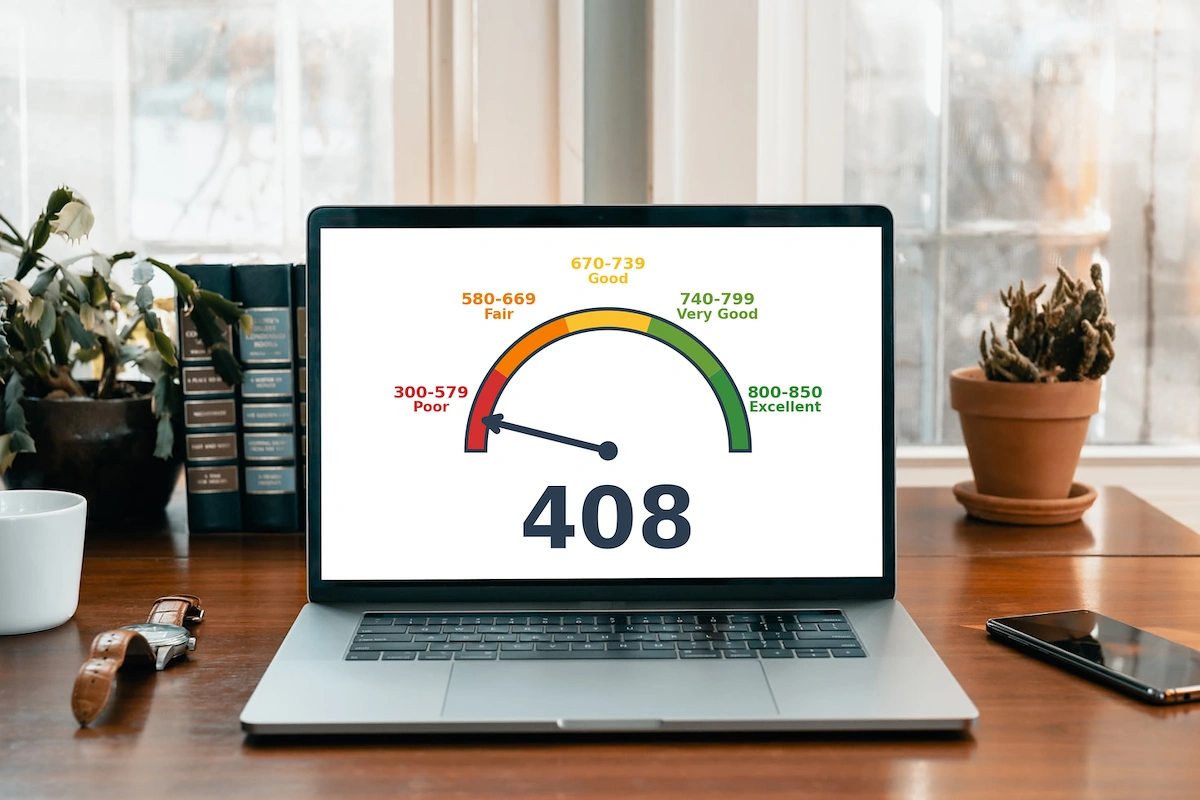
Kudos has partnered with CardRatings and Red Ventures for our coverage of credit card products. Kudos, CardRatings, and Red Ventures may receive a commission from card issuers. Kudos may receive commission from card issuers. Some of the card offers that appear on Kudos are from advertisers and may impact how and where card products appear on the site. Kudos tries to include as many card companies and offers as we are aware of, including offers from issuers that don't pay us, but we may not cover all card companies or all available card offers. You don't have to use our links, but we're grateful when you do!
408 Credit score: What You Need to Know in 2026
July 1, 2025


TL;DR
A 408 credit score is an opportunity to build a stronger credit profile from the ground up. This score falls within the "Poor" FICO score category, which provides a clear starting point for making improvements.
What Does a 408 Credit Score Mean?
A 408 credit score places you firmly in the "poor" credit range on the FICO scale, which runs from 300 to 850. Lenders see a score this low as a major red flag, indicating a high risk of default based on past credit behavior. This perception can create significant roadblocks in your financial life, as most creditors will be wary of extending you any new lines of credit.
Financially, this means you'll likely struggle to get approved for mortgages, auto loans, or unsecured credit cards. In the rare case that you are approved, the terms will almost certainly be unfavorable, including steep interest rates and fees. While a 408 score presents considerable challenges, it's not a permanent financial sentence; credit profiles can evolve over time.
Who Has a 408 Credit Score?
While age isn't a direct factor in credit score calculations, there's a clear trend of scores improving over time. Here's a look at the average FICO score by generation, based on 2023 Experian data:
- Generation Z (ages 18-26): 680
- Millennials (ages 27-42): 690
- Generation X (ages 43-58): 709
- Baby Boomers (ages 59-77): 745
- Silent Generation (ages 78+): 760
Credit Cards With a 408 Credit Score
A credit score of 408 falls into the 'very poor' range, which can make qualifying for a credit card a significant challenge. Lenders generally view scores this low as a sign of high risk, meaning you'll likely face denials for most traditional, unsecured credit cards. Your options will probably be limited to secured cards that require a cash deposit or specific subprime cards that come with steep fees and high interest rates.
Kudos can help you find the right card for your situation with its personalized recommendation tools, which match you to cards based on your financial preferences and spending habits. These tools allow you to compare options, including those with lower fees or interest rates, and provide insights into how a new card might impact your credit score.
Auto Loans and a 408 Credit Score
A 408 credit score places you in the deep subprime category, which can make securing an auto loan challenging. While approval is possible, you will likely face significantly higher interest rates compared to borrowers with better credit.
According to a 2025 auto loan analysis, interest rates for new and used cars break down as follows by credit score:
- Super-prime (781-850): 5.25% for new cars and 7.13% for used cars
- Prime (661-780): 6.87% for new cars and 9.36% for used cars
- Non-prime (601-660): 9.83% for new cars and 13.92% for used cars
- Subprime (501-600): 13.18% for new cars and 18.86% for used cars
- Deep subprime (300-500): 15.77% for new cars and 21.55% for used cars
Mortgages at a 408 Credit Score
A 408 credit score makes qualifying for a traditional mortgage highly unlikely. According to current mortgage requirements, even the most accessible FHA loans require a minimum score of 500 with a 10% down payment. Conventional loans typically require a score of at least 620, meaning a 408 is well below the necessary threshold for most lenders.
Even if you found a specialty lender willing to consider your application, a low score significantly impacts loan terms. You would face much higher interest rates and fees to compensate for the lender's risk. Lenders may also cap the loan amount you can borrow, limiting your options for homes. In practice, very few mortgages are approved for borrowers with scores below 600.
What's in a Credit Score?
Figuring out what goes into your credit score can feel like trying to solve a complex puzzle, but it generally boils down to a handful of key elements. The most common factors include:
- Your payment history, which tracks whether you pay your bills on time, is the most significant factor.
- Credit utilization, or the amount of credit you're using compared to your total available credit, also plays a major role.
- The length of your credit history demonstrates your experience with managing credit over time.
- Having a healthy mix of different types of credit, such as credit cards and installment loans, can positively impact your score.
- Finally, recent credit inquiries, which occur when you apply for new credit, are also taken into account.
How to Improve Your 408 Credit Score
Having a 408 credit score can feel discouraging, but it's entirely possible to rebuild your financial standing. There are several proven methods to improve your score, and with consistent habits, you can see meaningful changes over time.
- Monitor your credit reports regularly. Reviewing your reports helps you spot and dispute inaccuracies or signs of fraud that could be dragging down your score. You can get your free credit reports to ensure all the information is correct and track your progress.
- Set up automatic bill payments. Your payment history is the most significant factor in your credit score, so even one late payment can be damaging. Automating payments ensures you never miss a due date, helping you build a crucial foundation of on-time payment history.
- Lower your credit utilization ratio. This ratio compares your credit card balances to your total credit limits, and keeping it below 30% is a key goal. Paying down balances shows lenders you aren't over-reliant on debt, which is a major step toward improving a poor credit score.
- Become an authorized user. If you have a trusted friend or family member with a good credit history, ask to be added as an authorized user on their account. Their positive payment history and low credit utilization can be added to your credit file, potentially giving your score a quick boost.
For more help managing your cards and maximizing rewards as you build your credit, consider using a financial companion like Kudos.
Unlock your extra benefits when you become a Kudos member

Turn your online shopping into even more rewards

Join over 400,000 members simplifying their finances

Editorial Disclosure: Opinions expressed here are those of Kudos alone, not those of any bank, credit card issuer, hotel, airline, or other entity. This content has not been reviewed, approved or otherwise endorsed by any of the entities included within the post.



































.webp)







